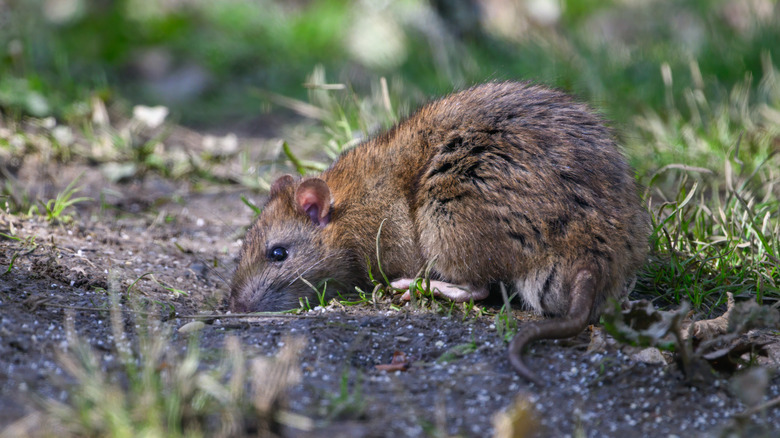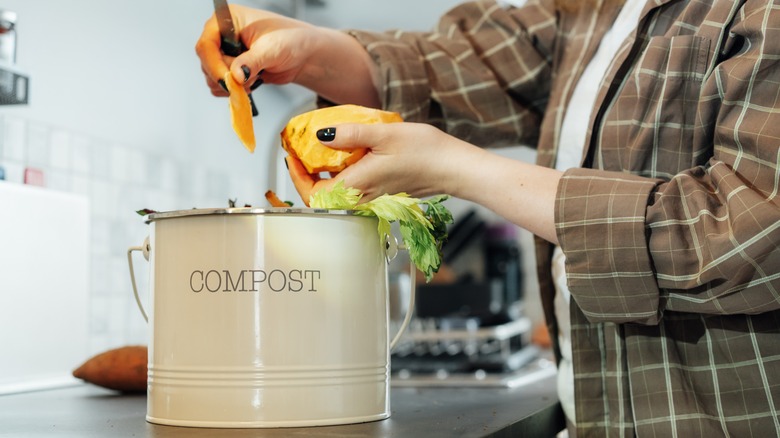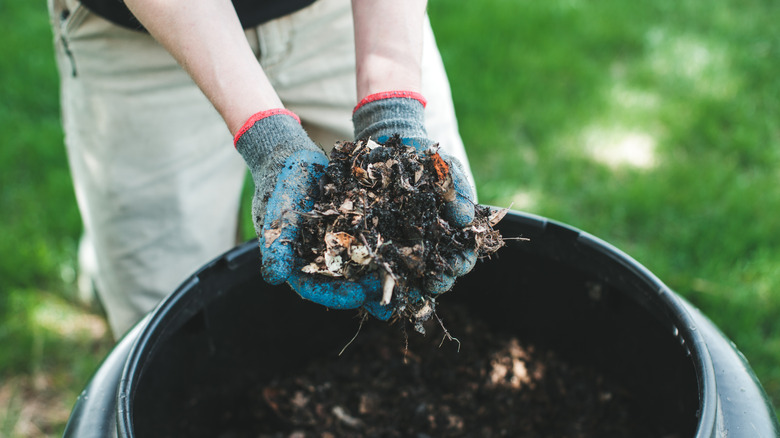Outdoor Compost Bin Mistakes That Are Attracting Pests To Your Yard
We may receive a commission on purchases made from links.
Starting a compost bin can be exciting, especially if you have big dreams of a beautiful yard full of thriving plants. Plus, there are big benefits to composting at home: you're cutting down on food waste and making your home more eco-friendly. So what's not to love? Pests.
To be clear, certain types of pests are part of the composting process. There is no breaking down of organic matter into a gardener's beloved black gold (a.k.a., compost) without tiny microorganisms, bacteria, and insects. But sometimes, a few key mistakes can attract unwelcome pests, like rodents, ants, and flies, to your compost bin. And while this might not seem like a huge deal, these little pests can cause you big problems. Rodents may bring in potential diseases, ants and centipedes prey on the bugs breaking down the compost, and ants can even steal important nutrients that compost is known for. Common compost bin mistakes that are attracting pests include adding too much meat, not turning your compost, and not securing the bin.
These pest-attracting composting mistakes start indoors
Believe it or not, the first step to keeping pests out of your compost bin starts in the kitchen. Certain food scraps, like meat, dairy, and grease, can smell yummy to pests, attracting them to your yard's compost bin to investigate. A good rule of thumb to prevent this is to think of your compost pile as a veggie lover; it just wants all the greens and plant-based foods. The Environmental Protection Agency also recommends skipping adding large portions of cooked meals to your compost bin to further reduce pest-attracting smells. Make collecting kitchen waste easier by making your own indoor compost bin. If you don't want to DIY it, there are tons available in stores. If you're worried about possible odors, look for one with an activated charcoal filter, like the Utopia Kitchen Compost Bin.
While your household compost bin can handle some household waste, like shredded uncolored paper, avoid adding pet waste. It might seem more eco-friendly, but it's not worth it. Besides not smelling great, pet manure can attract flies, pollute your compost, and spread diseases.
Composting mistakes you're making outside that entice pests
On the surface, composting feels simple: add some kitchen waste, some leaves, and wait until it turns into nature's fertilizer. But simply piling kitchen scraps on top is like ringing the dinner bell for local pests. Instead, dig a hole in the compost, add the scraps, then cover them up, adding a few inches of carbon-rich materials like twigs, shredded cardboard, or yard clippings. (Before composting your weeds, make sure they don't have any dried seeds so you don't accidentally reintroduce them to your garden.)
Forgetting to turn your compost regularly is another big mistake because there's nothing more attractive to rodents than a nice, warm space where food is readily provided. Turning your compost at least monthly not only helps break down the scraps but also discourages pests from making a home inside your bin. Make sure to fully secure the lid every time you add to your bin to make it difficult for bugs and rodents to break in. If you still have pest problems, consider changing to a compost bin on legs to get it up away from the ground, such as the VIVOSUN Outdoor Tumbling Composter. Or, add small wire mesh (look for ¼ inch or smaller) to the underside of your bin to discourage animals from tunneling in.


